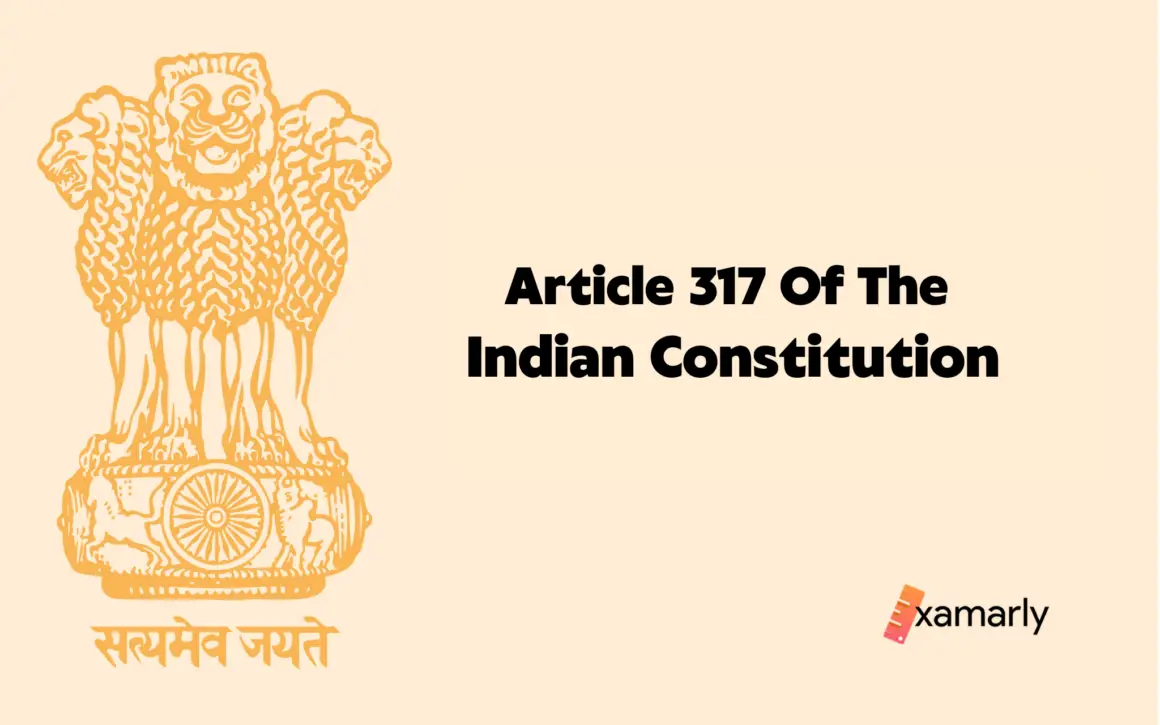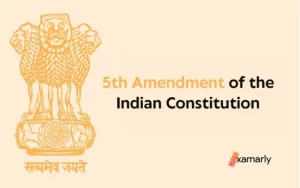Article 317 of the Indian Constitution pertains to the removal of the Chairman and members of a Public Service Commission.
It lays down the protocols and procedures for the same as according to this article, the Chairman or any other member of a Public Service Commission (which includes the Union Commission, State Commission, and Joint Commission) can be removed from office only by an order of the President of India (in the case of the Union Commission or Joint Commission) or the Governor of the state (in the case of a State Commission), and only on the ground of misbehaviour or incapacity.
Let us dig deep into Article 317 of the Indian Constitution and grasp all the concepts in the best possible way.
- Article 317 Of The Indian Constitution – In Details
- Clause 1 – As it is & Explained
- Clause 2 – As it is & Explained
- Clause 3 – As it is & Explained
- Clause 4 – As it is & Explained
- Summing Up
- FAQs On Article 317 Of The Indian Constitution
- What is the purpose of Article 317 of the Indian Constitution?
- Who has the authority to remove the Chairman or any other member of a Public Service Commission from office?
- On what grounds can the Chairman or any other member of a Public Service Commission be removed from office?
- What is the process for removing the Chairman or any other member of a Public Service Commission from office?
- Can the Chairman or any other member of a Public Service Commission be removed from office in circumstances other than misbehaviour or incapacity?
Article 317 Of The Indian Constitution – In Details
Let us break down each and every clause present in Article 317 of the Indian Constitution to have an in-depth understanding of all the clauses.
Clause 1 – As it is & Explained
Subject to the provisions of clause (3), the Chairman or any other member of a Public Service Commission shall only be removed from his office by order of the President on the ground of misbehaviour after the Supreme Court, on reference being made to it by the President, has, on inquiry held in accordance with the procedure prescribed in that behalf under article 145, reported that the Chairman or such other member, as the case may be, ought on any such ground to be removed.
The first clause of Article 317 of the Indian Constitution says that except as provided in clause (3), the President may not remove the Chairman or any other member of a Public Service Commission for misbehaviour without first referring the matter to the Supreme Court.
It must then conduct an inquiry in accordance with the procedure prescribed in that behalf under article 145 and then issue a report stating that the Chairman or such other member, as the case may be, ought to be removed from office.
Clause 2 – As it is & Explained
The President, in the case of the Union Commission or a Joint Commission, and the Governor in the case of a State Commission, may suspend from office the Chairman or any other member of the Commission in respect of whom a reference has been made to the Supreme Court under clause (1) until the President has passed orders on receipt of the report of the Supreme Court on such reference.
According to the second clause of Article 317 of the Indian Constitution, until the President has passed orders on receipt of the report of the Supreme Court on such reference, the President may suspend the Chairman or any other member of the Commission in respect of whom a reference has been made to the Supreme Court under clause (1).
This applies to both Union and State Commissions.
You Might Also Like To Read – Article 270 Of The Indian Constitution
Clause 3 – As it is & Explained
Notwithstanding anything in clause (1), the President may by order remove from office the Chairman or any other member of a Public Service Commission if the Chairman or such other member, as the case may be,—
(a) is adjudged an insolvent; or
(b) engages during his term of office in any paid employment outside the duties of his office; or
(c) is, in the opinion of the President, unfit to continue in office by reason of infirmity of mind or body.
The third clause of Article 317 of the Indian Constitution states that the President or Governor may remove the Chairman or any other member of a Public Service Commission from office in these circumstances “notwithstanding anything in clause (1)” of Article 317.
Clause (1) of this article states that the Chairman or any other member of a Public Service Commission can be removed from office only on the ground of misbehaviour or incapacity, and only after following the procedures outlined in the rest of the article.
However, this clause allows the President or Governor to remove the Chairman or member from office in the specific circumstances listed, regardless of whether they are related to misbehaviour or incapacity.
Clause 4 – As it is & Explained
If the Chairman or any other member of a Public Service Commission is or becomes in any way concerned or interested in any contract or agreement made by or on behalf of the Government of India or the Government of a State or participates in any way in the profit thereof or in any benefit or emolument arising therefrom otherwise than as a member and in common with the other members of an incorporated company, he shall, for the purposes of clause (1), be deemed to be guilty of misbehaviour.
The first clause of Article 317 of the Indian Constitution states that the Chairman or any other member of a Public Service Commission can be removed from office only on the ground of misbehaviour or incapacity, and only after following the procedures outlined in the rest of the article.
This fourth clause of Article 317 of the Indian Constitution is therefore stating that if the Chairman or member is found to be involved in any way with a government contract or agreement in a manner that could be seen as a conflict of interest, they will be considered to have behaved improperly and may be subject to removal from office.
Summing Up
Article 317 of the Indian Constitution talks about the provisions regarding the removal and suspension of Public Service Commission chairs and members.
The Chairman or any other member of a Public Service Commission can only be removed for misbehaviour or incapacity after following certain procedures. The President of India (Union Commission or Joint Commission) or the Governor of a state (State Commission) must consult the Supreme Court before ordering the removal.
FAQs On Article 317 Of The Indian Constitution
Here are some frequently asked questions about Article 317 of the Indian Constitution:
What is the purpose of Article 317 of the Indian Constitution?
Article 317 of the Indian Constitution pertains to the removal of the Chairman and members of Public Service Commissions from office. It outlines the procedures that must be followed and the grounds on which the Chairman or any other member of a Public Service Commission can be removed from office.
Who has the authority to remove the Chairman or any other member of a Public Service Commission from office?
The President of India has the authority to remove the Chairman or any other member of the Union Commission or Joint Commission from office, while the Governor of a state has the authority to remove the Chairman or any other member of a State Commission from office.
On what grounds can the Chairman or any other member of a Public Service Commission be removed from office?
The Chairman or any other member of a Public Service Commission can be removed from office only on the grounds of misbehaviour or incapacity.
What is the process for removing the Chairman or any other member of a Public Service Commission from office?
Before making an order for the removal of the Chairman or any other member of a Public Service Commission on the grounds of misbehaviour or incapacity, the President or Governor must consult the Supreme Court. If the President or Governor proposes to make an order for the removal of the Chairman or any other member of a Public Service Commission on the grounds of misbehaviour or incapacity, he or she must refer the matter to the Supreme Court for an inquiry. If, after considering the report of the Supreme Court, the President or Governor is satisfied that the Chairman or any other member of a Public Service Commission ought to be removed on the grounds of misbehaviour or incapacity, he or she may make an order to that effect. The Chairman or any other member of a Public Service Commission against whom an order for their removal has been made has the right to appeal to the Supreme Court against the order.
Can the Chairman or any other member of a Public Service Commission be removed from office in circumstances other than misbehaviour or incapacity?
Yes, there are certain circumstances in which the President or Governor may remove the Chairman or any other member of a Public Service Commission from office regardless of whether they are related to misbehaviour or incapacity. These circumstances are specified in another clause of Article 317.






